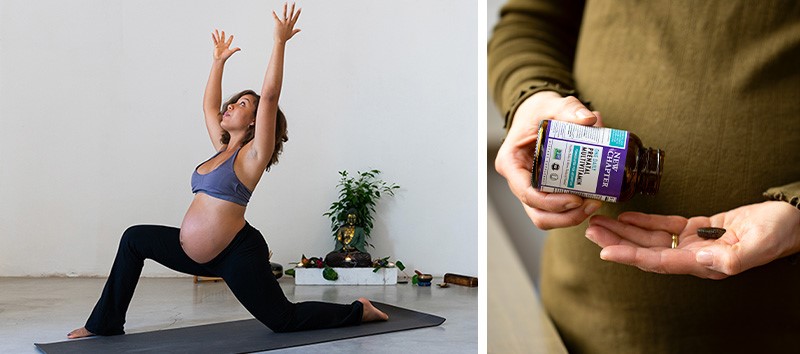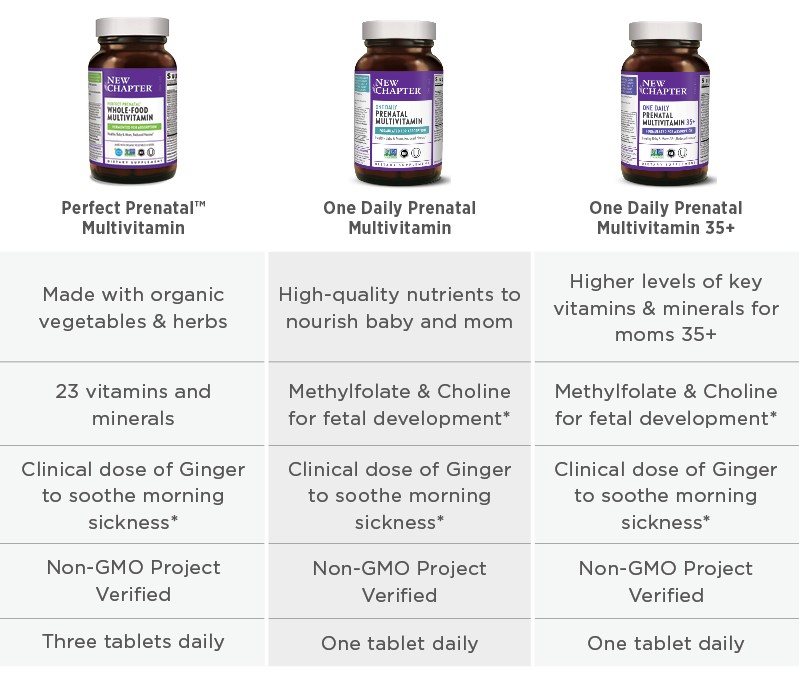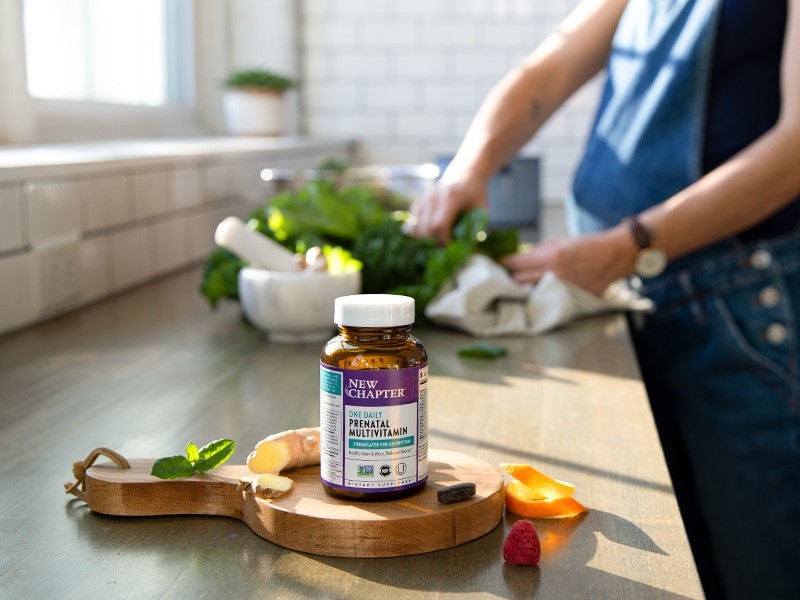
If you are pregnant or trying to conceive, it might feel like you are on baby-time. You are wrapped up in nursery colors, health appointments, handy apps, lists of names. You are researching prenatal must-haves, and of course you are in the market for the best multivitamins for pregnancy. A prenatal vitamin makes perfect sense when you are in this frame of mind: you have got big plans for your bundle of joy, and you are ready for the multivitamin that will meet your and your little person’s needs.
But what if you are not trying for a baby or you are not even sure about having kids? Should you, too, consider a prenatal vitamin? The answer could still be yes! Let us take a closer look at prenatal vitamins and how to find the best one for you.
What is a prenatal vitamin?
Nowadays, a prenatal multivitamin is a blend of supplemental nutrients specifically targeted to the needs of women who are pregnant or could become pregnant. Prenatal nutrition has come a LONG way since vitamin companies began to add isolated folic acid to their regular formulas in the 1970’s. We know now that a mom-to-be needs customized nutrition. While the prenatal vitamin of yester-year may have been for women who were already pregnant, the prenatal of today can start meeting your needs even if you are just thinking about getting pregnant. Prenatal multivitamins can provide reliable nutrition in vital areas—and peace of mind that your body is getting good foundational support.
A regular prenatal vitamin should include nutrients that moms need more of during their pregnancy. However, we do not want just any run-of-the-mill prenatal multivitamin, do we? You probably want top-of-the-line nutrition provided by high-quality, third-party validated prenatal vitamins. The good news is, prenatal multivitamins have gotten an upgrade in the last few years and now can include fermented nutrients, pregnancy-safe herbs, chelated minerals and much more.
Who needs a prenatal vitamin?
In general, prenatal vitamins are taken by women who are pregnant or planning to be pregnant. They help you to be sure you are getting crucial vitamins and minerals for baby and you on a daily basis. Since about half of all pregnancies are unplanned, the Centers for Disease Control also recommends that women who COULD get pregnant take vitamins that provide the equivalent of 400 mcg of folic acid daily… before conception even occurs. Why is this? Well, Folic Acid is a B Vitamin that supports early neural tube development, particularly in the first 28 days after conception. But most women do not know they are pregnant until at least 2 weeks after conception… so taking Folic Acid regularly before pregnancy can help avoid this gap.
Prenatal vitamins when not pregnant or even planning to get pregnant have benefits, too! Maybe you have heard that prenatal vitamins are awesome for your hair, skin, and nails? They absolutely are. With the B vitamins included, both your energy and your nail growth could experience a nice boost.*

What are the benefits of prenatal vitamins?
Let’s face it, eating healthy during pregnancy is not the easiest thing. If you are experiencing cravings and morning sickness, your nutrition could be all over the place. Plus, food is less nutrient dense now than it was 50+ years ago, since we do not tend to grow our food for nutrition, but rather for quantity. While women may be turning to healthy foods like spinach to meet their pregnancy nutrition needs, they may not know that 100 grams of spinach has 30% less Vitamin A, 50% less Vitamin C and 20% less Calcium than it did in the 1950’s, according to research. Taking regular prenatal vitamins helps cover your nutritional bases and give you the A through Zinc you need each day, which can be such a relief to know.
Another nice benefit is that prenatal vitamins are made with your needs in mind, so it is simple to just take a tablet instead of trying to research and track various nutrients each day. While Iron and Folic Acid may be nutrients you know about, there are plenty of nutrients a good prenatal vitamin can give you that you do not know about! For example, women need more Iodine during pregnancy to support thyroid function, and yet not many women are cruising their prenatal nutrition facts panel looking for it. Chromium is also a good prenatal ingredient.
Specific benefits to expect from a prenatal include:
Immune support from Vitamins A, C and Zinc*
Energy support from B Vitamins*
Blood oxygen transport from Iron*
Healthy spine & brain development from Folic Acid*
Thyroid support from Iodine*
Healthy overall pregnancy support from multiple nutrients*
What to look for in a prenatal vitamin?
While you COULD get all recommended nutrients from food, like eating red meat for Iron, drinking milk for Vitamin D, and eating dark greens for Folate, we all know that sometimes our diet is not as perfect as we would like it to be. Many people are also lactose intolerant, so dairy foods are not an option. So, supplementing with vitamins gives you peace of mind, especially on days when your diet is less than perfect. The following prenatal vitamin ingredients are crucial when you are seeking your go-to prenatal vitamin.
FOLIC ACID OR FOLATE
Taken before conception, Folate helps support healthy birth weight and development of baby’s brain and spinal cord.* So it makes total sense that Folate or Folic Acid tends to top everyone’s list for nutrients in prenatal vitamin ingredients.
However, this is one complicated nutrient! Let us break it down.
Folate is a general term for a group of water-soluble B vitamins known as B9. While Folate naturally occurs in leafy greens, like spinach and kale, your body must break down the Folate in food to make Methylfolate that it can use. Breads and cereals are often fortified with Folic Acid, and it too must be broken down by the body to make bioavailable methylfolate.
Add to this that there are a group of individuals who have a gene mutation and cannot break down Folic Acid and Folate as well as others. For these individuals, supplementing with Methylfolate helps support their Folate needs. Read the supplement facts to see what type of Folate is in your multivitamin.
VITAMIN D
Vitamin D is an important nutrient that many of us are deficient in. While humans normally get Vitamin D with help from the sun, many factors interfere with our ability to make enough. Using a sunscreen or even wearing clothes cuts down on the amount of sunlight that hits our skin and helps us create our own Vitamin D.
Vitamin D is an essential nutrient during pregnancy, as it not only supports the immune system, but also supports healthy bones and teeth.* Look for a prenatal that provides 1000 IU (25 mcg) of Vitamin D3. For moms over 35, there may be a need for more Vitamin D to support your body during pregnancy, so look for a prenatal vitamin with 2000 IU (50 mcg) of D3.
IRON
Pregnant women are vulnerable to iron deficiency and make up almost a quarter of the world’s anemic population. Plus, Iron needs tend to increase as pregnancy goes on. Pregnant women need iron to help make the extra blood necessary for you and baby during pregnancy. Iron supports oxygen getting from your lungs to the rest of your body and to your baby!
Whether you are a vegetarian, struggling with morning sickness that has you pushing away meat, or just because eating a daily steak is not very practical, prenatal vitamins with iron are a must-have. Many iron supplements can lead to constipation and stomach upset, so choosing the right iron is essential to help you stay on track with your prenatal. For a tummy-friendly Iron, look to fermented Iron and/or chelated Iron Bisglycinate. Iron Bisglycinate was shown to be absorbed twice as well as isolated iron and led to fewer gastrointestinal complaints. The recommended amount of Iron for pregnant women (100% Daily Value) is 27 mg.
Foods to Eat While Pregnant
Like anyone else, pregnant women should aim to eat a healthy, balanced diet. Consuming a variety of proteins, whole grains, legumes, and colorful fruits and vegetables can give you and your baby high-quality building blocks for growth. Talk to your healthcare provider about food safety and things to limit or avoid while pregnant.
One macronutrient group that can be tricky is protein. Your healthcare practitioner may recommend getting 75+ grams of protein per day during pregnancy—but where should it come from? Here are some healthy protein sources you can mix into your weekly routine.
Protein-rich food | Amount of Protein |
Cooked chicken, beef, turkey, pork (3 ounces) | 20-28 g |
Canned salmon with bones (3 ounces) | 17 g |
Cottage cheese (4 ounces) | 12 g |
Black beans, cooked/canned (1 cup) | 15 g |
Lentils, boiled (½ cup) | 9 g |
Peanut butter (2 T) | 7 g |
Whole egg (1 large) | 6 g |
Sources for nutrition data: Mayo Clinic, United States Department of Agriculture | |
Omega-3 fatty acids DHA and EPA are important for baby’s healthy development during pregnancy, too. These good fats are the foundation for healthy brain and eye tissues. Moms can get Omega-3s from fish, but if it is hard to eat the recommended 1-3 servings of fatty cold-water fish per week, Wholemega™ for Moms fish oil is just for you—delivering those critical omega-3s from naturally pure Wild Alaskan Salmon (and in an easy-to-swallow tiny soft gel, too).
The Difference with Fermented Vitamins
Where most companies stop with nutrition is where some others are just getting started! New Chapter takes great care to formulate multivitamins for absorption, and this includes using a pioneering process of fermenting key vitamins and minerals. To ferment, we take high-quality nutrients and the finest organic whole foods and culture them together in a rich broth of Saccharomyces cerevisiae (an organic beneficial yeast). The nutrients get incorporated right into the yeast’s cell structure. When your body encounters the fermented nutrient, it does not say, “Hey, that’s isolated iron or zinc. I can’t figure out how to use that!” Instead, your body sees the nutrient as part of a food matrix and can recognize and utilize them as food.
When to Take a Prenatal Vitamin
New Chapter fermented multivitamins are gentle enough to take anytime, even on an empty stomach. However, you can certainly take a prenatal multivitamin with food to further support nutrient absorption and if it helps to keep your tummy happy.
It also helps to know your habits to set yourself up for success. If you can only remember to take one tablet a day, a One Daily Prenatal Vitamin is a great choice. If you want to spend a little more time on getting top-of-the-line prenatal nutrition, a complete prenatal with a 3-tablet dose spaced out throughout the day will keep your blood levels of important nutrients more constant. You can also check out our blog post on more tricks to remember your vitamins.
Are there side effects of prenatal multivitamins?
One of the most common prenatal vitamin side effects is a queasy stomach or “vitamin stomach.” Fortunately, New Chapter prenatals are formulated to be gentle on the stomach. Make sure to read the labels of supplements you are planning to take during pregnancy and check in with your healthcare practitioner before adding something new.
Tips for Choosing a Prenatal Vitamin
The most expensive vitamin you will ever buy is the one you don’t take! Be realistic about your lifestyle and challenges in nutrition to help you choose the best prenatal vitamin for your pregnancy. If you eat a mostly balanced diet, are on-the-go, and often forget to take your supplements, a One Daily may be your best option. If you feel like your diet really needs a boost, go for the extra nutrition included in a multiple per day fermented option. If you are over the age of 35, you may need extra nutrient support in some areas, so choose a multivitamin tailored to your life stage.

Moms-to-be love that all three of New Chapter’s prenatals are Non-GMO Project Verified and include a clinical dose of Ginger to soothe morning sickness.* Here is a quick guide to our formulas:
- Perfect Prenatal multivitamin includes 23 vitamins and minerals and is made with organic vegetables & herbs, all in 3 nutrient-packed tablets.
- One Daily Prenatal is formulated with over 100% DV of Methylfolate (the most active form of Folate) and includes Choline, an essential nutrient for pregnancy.
- One Daily Prenatal 35+ also has Methylfolate & Choline, plus higher levels of Vitamins C, D3, E, B6, B12, Zinc, Magnesium & Chromium for the needs of moms 35+
Can I continue living an active lifestyle while pregnant?
Most women will be able to continue having an active lifestyle during pregnancy, but some will need to take it easier, depending upon their health needs and challenges. It is always best to talk to your healthcare provider about how much and what kind of activity is right for you. In general, physical activity recommendations during and after pregnancy are to get at least 150 minutes of moderate-intensity aerobic activity per week (such as 30 minutes a day on 5 days per week). Brisk walking is an example of this type of exercise.
What is the importance of prenatal and postnatal care?
Prenatal care with a qualified healthcare practitioner can begin long before you are even pregnant. If you are trying to conceive or it’s possible you might become pregnant, you can start planning now with guidance from your doctor or midwife.
During pregnancy, follow your healthcare provider’s advice for recommended checkups and other prenatal care. This often includes scheduled tests and screenings that help track and support your baby’s healthy development.
Do not forget to get recommended postpartum care, too! Typically, new moms will visit their healthcare practitioner several weeks after giving birth. If you are breastfeeding (which is a great choice!), you can also get vital help from a lactation expert. Be sure to take great postnatal care of yourself as you care for your baby—because it benefits you both.
What is the difference between prenatal and postnatal vitamins?
Prenatal vitamins are targeted for women’s needs before and during pregnancy, or if you are looking to support foundational health in general. After giving birth, your body, and your needs change, so there are also postnatal vitamins that are fine-tuned for new and nursing moms. A dedicated postnatal multivitamin can provide key benefits for moms such as mood, energy, lactation, immune, and thyroid support.* For women who are nursing, the right postnatal can also deliver herbs traditionally used by breastfeeding women, including organic Oat, Turmeric, and Chamomile.
Looking for other ways to stay healthy during pregnancy?
Self-care during pregnancy is essential. Do your best to include a rainbow of foods on your plate (where possible). Check out a prenatal yoga class or find a mommy group online for a good support network. Educate yourself on the changes within your body so you can know what to expect and there are fewer surprises along the way (except, of course, the good kind!).
Remember that this time is special and one-of-a-kind. Be compassionate with yourself—it is hard work to be pregnant, even when you are sitting still! Enjoy the knowledge that you are bringing into being new joy that will make its own unique mark on the world, and that you will have the most special title in the world to that person: mom.
*These statements have not been evaluated by the Food and Drug Administration. This product is not intended to diagnose, treat, cure, or prevent any disease.
© Copyright 2021 New Chapter, Inc.
Created By: By Charlotte Traas, New Chapter® Director of Education
Feb 26th, 2021


